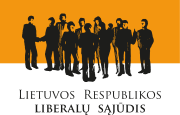Liberal Movement (Lithuania)
Liberal Movement Lietuvos Respublikos Liberalų sąjūdis | |
|---|---|
 | |
| Abbreviation | LRLS |
| Chairman | Remigijus Šimašius |
| First Vice Chairman | Eugenijus Gentvilas |
| Vice Chairpeople |
Aušrinė Armonaitė Petras Auštrevičius Vitalijus Gailius Simonas Gentvilas Simonas Kairys Edita Rudelienė Marcijonas Urmonas |
| Executive Secretary | Renaldas Vaisbrodas |
| Founded | February 25, 2006 |
| Split from | Liberal and Centre Union |
| Headquarters | J. Tumo–Vaižganto g. 9/1, Vilnius |
| Membership | ~6,000 (the end of 2015)[1] |
| Ideology |
Classical liberalism Conservative liberalism Pro-Europeanism |
| Political position | Centre-right |
| European affiliation | Alliance of Liberals and Democrats for Europe |
| European Parliament group | Alliance of Liberals and Democrats for Europe |
| Colours | Orange |
| Seimas |
14 / 141 |
| European Parliament |
2 / 11 |
| Municipal councils |
217 / 1,473 |
| Mayors |
10 / 60 |
| Website | |
|
www | |
The Liberal Movement[2][3][4][5] (Lithuanian: Liberalų Sąjūdis), formally the Liberals' Movement of the Republic of Lithuania (Lithuanian: Lietuvos Respublikos Liberalų sąjūdis) and abbreviated to LRLS, is a conservative-liberal[6] political party in Lithuania.
Following the October 2012 General Election, the Liberal Movement has ten members of the Seimas. It previously participated in a governing coalition, along with the Homeland Union – Lithuanian Christian Democrats and Liberal and Centre Union. It has two MEPs in the European Parliament, Leonidas Donskis and Antanas Guoga, who sit in the Alliance of Liberals and Democrats for Europe (ALDE) Group. The LRLS is a member of the Alliance of Liberals and Democrats for Europe (ALDE) Party.
History
The party was founded in 2006 by dissident members of the Liberal and Centre Union that were unhappy with Artūras Zuokas's leadership.
In the legislative elections of 2008, the first elections LRLS has ever taken part in, it gained 11 seats in the Seimas and 5.72 percent of the national vote. The LRLS formed a coalition with the Homeland Union, the Liberal and Centre Union, and the National Resurrection Party. This coalition gained a combined governmental majority of 80 out of 141 seats in the Seimas, led by Prime Minister Andrius Kubilius of the Homeland Union. At the subsequent elections of 2012, the party lost one seat to finish with 10 seats in the Seimas and 8.57 percent of the national vote.
After party's leader Eligijus Masiulis allegedly took a bribe of 100,000 euro, Antanas Guoga took his position. But he was the chairman for 4 days only, and has resigned. The mayor of Vilnius, Remigijus Šimašius, is the current chairman of the party.
Members of the European Parliament
| Parliamentarian | Born | Occupation | From | To |
|---|---|---|---|---|
| Petras Auštrevičius | 1963 | Diplomat | 2014 | (2019) |
Current Members of the Seimas
| Parliamentarian | From | Constituency |
|---|---|---|
| Virgilijus Alekna | 2016 | Nationwide |
| Aušrinė Armonaitė | 2016 | Nationwide |
| Juozas Baublys | 2016 | Varėna-Trakai |
| Viktorija Čmilytė | 2015 | Nationwide |
| Vitalijus Gailius | 2012 | Pakruojis-Joniškis |
| Arūnas Gelūnas | 2016 | Nationwide |
| Eugenijus Gentvilas | 1990-1992; 2012 | Nationwide |
| Simonas Gentvilas | 2016 | Nationwide |
| Kęstutis Glaveckas | 1990-1992; 1996 | Nationwide |
| Ričardas Juška | 2016 | Jurbarkas-Pagėgiai |
| Jonas Liesys | 2008-2012: 2016 | Trakai-Vievis |
| Gintaras Steponavičius | 2000 | Nationwide |
| Gintaras Vaičekauskas | 2016 | Pajūrio (Klaipėda) |
| Jonas Varkalys | 2016 | Plungė |
Members of the Government of Lithuania
| Minister | Born | Position | From | To |
|---|---|---|---|---|
| Eligijus Masiulis | 1974 | Transport | 2008 | 2012 |
| Gintaras Steponavičius | 1967 | Education/Science | 2008 | 2012 |
| Remigijus Šimašius | 1974 | Justice | 2008 | 2012 |
See also
Footnotes
- ↑ Daugiausiai nario mokesčio surinko socdemai - 643 tūkst. Lt
- ↑ "Center-right to form Lithuanian coalition". The New York Times. 27 October 2008. Retrieved 22 September 2011.
- ↑ Adomaitis, Nerijus (26 October 2008). "Lithuania centre right wins vote as slowdown looms". Reuters. Retrieved 22 September 2011.
- ↑ Seputyte, Milda (26 October 2008). "Lithuanian Homeland Union Secures Victory in Election Run-Off". Bloomberg L.P. Retrieved 22 September 2011.
- ↑ "Lithuania: Political structure". The Economist. 11 March 2009. Retrieved 22 September 2011.
- ↑ Hans Slomp (26 September 2011). Europe, A Political Profile: An American Companion to European Politics [2 volumes]: An American Companion to European Politics. ABC-CLIO. pp. 536–. ISBN 978-0-313-39182-8.
External links
- (in Lithuanian) Liberal Movement official website
- (in Lithuanian)